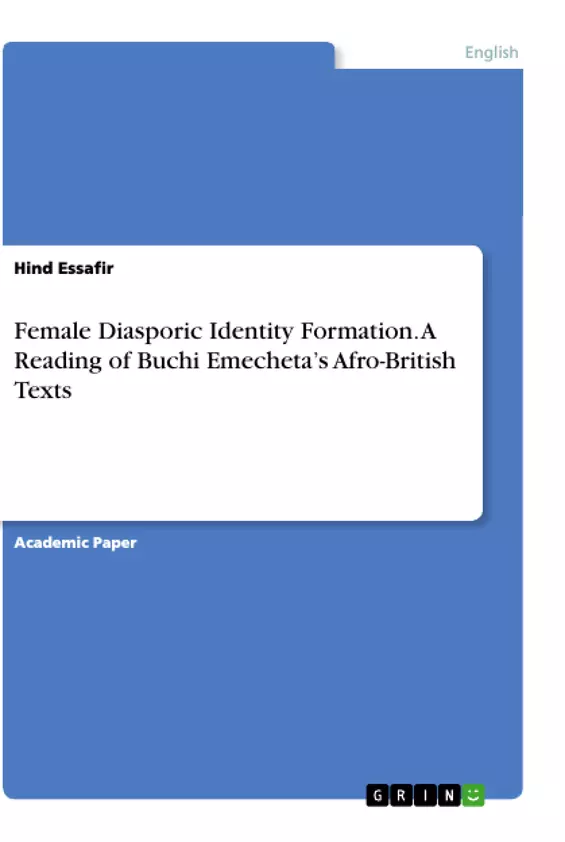Over the span of three centuries, the Afro-British tradition has managed to establish itself as a distinguished voice in Britain's literary and cultural scene. While unearthing its first attempts at self-definition, this dissertation first engages with the slave tradition in the particular context of Eighteenth century Enlightenment England, and explores how its emergence initiated the re-inscription of the black race within humankind after years of exclusion. By adopting a feminist and cultural perspective, this essay spotlights the female contribution, it equally examines the extent to which the double discrimination of race and gender further complicates the female identity formation project. Significantly, Second Class Citizen, In The Ditch and Head Above Water stand as typical Afro-British texts that strongly resonate with earlier voices of the tradition, while promoting strategies of resistance and ultimately disturbing contructions of womanhood and female subjectivity. Through these narratives, Buchi Emecheta inscribes herself as a true heiress of an Afro-British female textuality inaugurated two centuries earlier by a pioneering figure as prestigious as Mary Prince. In its effort to uncover the identity politics informing this literary and discursive body, this study lays emphasis on the significance of generic choice to the Afro-British female self-telling via autobiography, while placing it within the much wider project of nation-telling.
Inhaltsverzeichnis (Table of Contents)
- I. AUTOBIOGRAPHY: A FEMALE SELF-DEFINING MECHANISM.
- 1.1. Women's Autobiography: A Contribution to "Herstory"
- 1.2 Negotiating Identity:
- II. Buchi Emecheta's Autobiographical Fiction:..
- 2.1. Second Class Citizen / In the Ditch: Identity in liminality
- 2.2. Writing as an Empowering Practice:.
- III. AUTOBIOGRAPHY AS POLITICAL COMMITMENT:
- 3.1. Head Above Water or Self/Nation-Telling:..
- 3.2. Writing as a Movement Beyond Gender Roles:.......
Zielsetzung und Themenschwerpunkte (Objectives and Key Themes)
This work examines the formation of female diasporic identity through an analysis of Buchi Emecheta's Afro-British texts. It explores the ways in which Emecheta's writing engages with themes of autobiography, identity negotiation, and political commitment, particularly within the context of female experiences in diaspora.
- Autobiography as a Self-Defining Mechanism
- Identity Negotiation in Diaspora
- The Political Dimensions of Autobiography
- Feminist and Postcolonial Perspectives on Autobiography
- The Role of "Everyday Life" in Shaping Identity
Zusammenfassung der Kapitel (Chapter Summaries)
- Chapter 1: Women's Autobiography: A Contribution to "Herstory" explores the significance of autobiography as a genre for self-identification and the construction of "herstory," particularly within the context of feminist and postcolonial scholarship. The chapter analyzes the intersection of these two fields and their shared interest in deconstructing exclusionary dynamics within Western thought.
- Chapter 2: Buchi Emecheta's Autobiographical Fiction: Identity in Liminality analyzes two of Emecheta's novels, "Second Class Citizen" and "In the Ditch," focusing on how they portray the complexities of identity formation within liminal spaces. The chapter examines the themes of displacement, cultural negotiation, and the empowering potential of writing for marginalized individuals.
- Chapter 3: Head Above Water or Self/Nation-Telling: This chapter delves into Emecheta's autobiographical work, "Head Above Water," exploring the ways in which her writing functions as both a personal narrative and a contribution to the "telling of the nation." The chapter examines how Emecheta's writing transcends traditional gender roles and utilizes "the little happenings of everyday life" as a means of political engagement.
Schlüsselwörter (Keywords)
Key themes and concepts explored in this work include diasporic identity, female autobiography, liminality, postcolonialism, feminism, African women's writing, gender roles, political commitment, "herstory," and the empowering potential of writing.
- Arbeit zitieren
- Hind Essafir (Autor:in), 2019, Female Diasporic Identity Formation. A Reading of Buchi Emecheta’s Afro-British Texts, München, GRIN Verlag, https://www.grin.com/document/1117250



